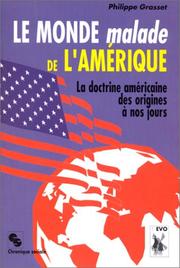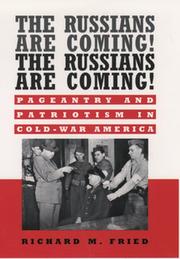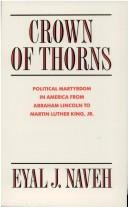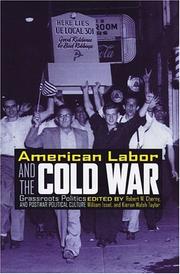| Listing 1 - 10 of 17 | << page >> |
Sort by
|

ISBN: 2870033478 9782870033470 Year: 1999 Publisher: Bruxelles: EVO,
Abstract | Keywords | Export | Availability | Bookmark
 Loading...
Loading...Choose an application
- Reference Manager
- EndNote
- RefWorks (Direct export to RefWorks)
Amerika --- Amérique --- Geschiedenis --- Histoire --- Maatschappij --- Politiek --- Politique --- Société --- National characteristics, American. --- Political culture --- Anti-Americanism. --- History. --- Political culture - United States - History.
Book
ISSN: 12961787 ISBN: 9782748904628 2748904621 Year: 2021 Publisher: Marseille: Agone,
Abstract | Keywords | Export | Availability | Bookmark
 Loading...
Loading...Choose an application
- Reference Manager
- EndNote
- RefWorks (Direct export to RefWorks)
Nos leaders d’opinion ont une théorie pour expliquer les comportements de certains de nos concitoyens, qui exaltent la sagesse des foules ― et, cela va de soi, sont racistes, sexistes et homophobes. Ces égarés, assurent-ils, agissent sous l’emprise d’une doctrine rétrograde, le « populisme » ; et leurs adeptes sont des bourrins incultes qui ont une dent contre leurs congénères instruits. Le populisme est en guerre contre la pensée moderne et le progrès. Il est complice de la diffusion du mal, pour ne pas dire qu’il est le mal lui-même.La façon dont nos progressistes autoproclamés mésusent et abusent désormais du mot « populisme » prouve qu’ils se sont résolument tournés contre leur héritage démocratique. La démocratie pose un problème, expliquent-ils, parce qu’elle permet au peuple de faire fi de l’autorité des experts.Le paysage politique est cul par-dessus tête, mais le combat reste le même : le vrai sujet, ce sont les privilèges des élites, et le populisme est peut-être le remède permettant de nous en délivrer.
Populism --- Political culture --- Social movements --- Democracy --- History --- Populisme. --- Populisme --- Populism - United States - History --- Political culture - United States - History --- Social movements - United States - History --- Democracy - United States - History --- Histoire.

ISBN: 0199923744 1423760557 0195350782 160256812X 9781423760559 9780195070200 0195070208 9780198023487 0198023480 9780195350784 0195134176 0195070208 9780195134179 Year: 1998 Publisher: New York Oxford University Press
Abstract | Keywords | Export | Availability | Bookmark
 Loading...
Loading...Choose an application
- Reference Manager
- EndNote
- RefWorks (Direct export to RefWorks)
This book explores a widely lived yet little remembered facet of America's cultural and political history: the Cold War as experienced at the grassroots level. Here, Fried traces the cresting of modern patriotic observance during World War II and then shows how patriotic and civic activists afterwards labored to recreate a remembered unity and commitment in the tension-filled Cold War era. A variety of national and local entities mounted campaigns ""to sell America to the Americans"" through ""rededication"" celebrations like Know Your America Week and Freedom Week. The American Heritage Found
Anti-communist movements -- United States -- History. --- Cold War -- Social aspects -- United States. --- Pageants -- United States -- History -- 20th century. --- Patriotism -- United States -- History -- 20th century. --- Political culture -- United States -- History -- 20th century. --- United States -- Civilization -- 1945-.

ISBN: 0195070208 9780195070200 Year: 1998 Publisher: New York (N.Y.) : Oxford university press,
Abstract | Keywords | Export | Availability | Bookmark
 Loading...
Loading...Choose an application
- Reference Manager
- EndNote
- RefWorks (Direct export to RefWorks)
Anti-communist movements --- Political culture --- Cold War --- Patriotism --- Pageants --- History --- Social aspects --- United States --- Civilization --- History. --- 20th century --- 1945 --- -Patriotism --- Anti-communist movements - United States - History --- Political culture - United States - History - 20th century --- Cold War - Social aspects - United States --- Patriotism - United States - History - 20th century --- Pageants - United States - History - 20th century --- United States - Civilization - 1945 --- -Anti-communist movements
Book
ISBN: 9780230224506 0230224504 1349309516 9786612556616 0230240895 1282556614 Year: 2009 Publisher: Basingstoke: Palgrave MacMillan,
Abstract | Keywords | Export | Availability | Bookmark
 Loading...
Loading...Choose an application
- Reference Manager
- EndNote
- RefWorks (Direct export to RefWorks)
European federation --- Political culture --- History --- European Union --- Europe --- United States --- Economic integration --- Political aspects --- Politics and government --- European federation. --- European Union. --- Political aspects. --- Political culture - United States - History - 19th century --- Europe - Economic integration - Political aspects --- United States - Politics and government - 1783-1865
Book
ISBN: 0674058968 9780674058965 9780674048973 0674048970 9780674284333 9780674284333 067428433X 067428433X Year: 2014 Publisher: Cambridge: Harvard university press,
Abstract | Keywords | Export | Availability | Bookmark
 Loading...
Loading...Choose an application
- Reference Manager
- EndNote
- RefWorks (Direct export to RefWorks)
"[This book] reinterprets the American political tradition from the colonial period to modern times, placing issues of race relations, immigration, and presidentialism in the context of shifting notions of empire and citizenship. Today, while the U.S. enjoys tremendous military and economic power, citizens are increasingly insulated from everyday decision-making. This was not always the case. America, [the author] argues, began as a settler society grounded in an ideal of freedom as the exercise of continuous self-rule?one that joined direct political participation with economic independence. However, this vision of freedom was politically bound to the subordination of marginalized groups, especially slaves, Native Americans, and women. These practices of liberty and exclusion were not separate currents, but rather two sides of the same coin. However, at crucial moments, social movements sought to imagine freedom without either subordination or empire. By the mid-twentieth century, these efforts failed, resulting in the rise of hierarchical state and corporate institutions. This new framework presented national and economic security as society?s guiding commitments and nurtured a continual extension of America?s global reach. [The author] envisions a democratic society that revives settler ideals, but combines them with meaningful inclusion for those currently at the margins of American life."
Frontier and pioneer life --- Liberty --- Imperialism --- Political culture --- Democracy --- Hegemony --- Hegemonism --- Political science --- Sociology --- Unipolarity (International relations) --- History. --- United States --- Politics and government. --- Territorial expansion. --- Annexations --- Government --- History, Political --- Frontier and pioneer life - United States --- Liberty - History --- Imperialism - History --- Political culture - United States - History --- Democracy - United States - History --- Hegemony - United States - History --- Etats-Unis --- United States - Politics and government --- United States - Territorial expansion

ISBN: 0814757650 Year: 1990 Publisher: New York ; London New York University Press
Abstract | Keywords | Export | Availability | Bookmark
 Loading...
Loading...Choose an application
- Reference Manager
- EndNote
- RefWorks (Direct export to RefWorks)
United States - Politics and government - 1865-1933. --- United States - Politics and government - 1933-1945. --- United States - Politics and government - 1945 --- -Political culture - United States - History. --- Religion and politics - United States - History. --- Martyrs - United States - History. --- United States - Religion - 19th century. --- United States - Religion - 1901-1945. --- United States - Religion - 1945 --- -United States - Politics and government - 1865-1933. --- United States - Religion - 1945-
Book
ISSN: 18697054 ISBN: 311030760X 3110338270 9783110338270 9783110372991 3110372991 9783110307603 9783110338287 3110338289 1306529069 Year: 2014 Volume: 29 Publisher: Berlin: de Gruyter,
Abstract | Keywords | Export | Availability | Bookmark
 Loading...
Loading...Choose an application
- Reference Manager
- EndNote
- RefWorks (Direct export to RefWorks)
"So far most scholars have studied conspiracy theories within national frameworks only. Focusing on the United States and the Middle East, two regions entangled in multiple ways, this book draws attention to the fact that conspiracist visions are transnational narratives that travel between and connect different cultures"--Provided by publisher.
Conspiracy theories --- Political culture --- Conspiracies --- History --- Political crimes and offenses --- History. --- Errors, inventions, etc. --- Conspiracy --- United States --- Middle East --- Civilization --- Politics and government --- Relations --- Conspiracy theories - United States --- Conspiracy theories - Middle East --- Conspiracy - United States --- Conspiracy - Middle East --- Political culture - United States - History - 20th century. --- United States - Civilization --- Middle East - Civilization --- United States - Politics and government --- Middle East - Politics and government --- United States - Relations - Middle East --- Middle East - Relations - United States --- Comparative analysis. --- Conspiracy theories. --- Middle East. --- Transnational narratives. --- United States of America.


ISBN: 081353402X 0813537134 9786613839213 0813555051 128352676X 9780813537139 9780813534022 0813534038 9780813534039 9780813555058 9781283526760 6613839213 Year: 2004 Publisher: New Brunswick, NJ
Abstract | Keywords | Export | Availability | Bookmark
 Loading...
Loading...Choose an application
- Reference Manager
- EndNote
- RefWorks (Direct export to RefWorks)
The American labor movement seemed poised on the threshold of unparalleled success at the beginning of the post-World War II era. Fourteen million strong in 1946, unions represented thirty five percent of non-agricultural workers. Why then did the gains made between the 1930's and the end of the war produce so few results by the 1960's? This collection addresses the history of labor in the postwar years by exploring the impact of the global contest between the United States and the Soviet Union on American workers and labor unions. The essays focus on the actual behavior of Americans in their diverse workplaces and communities during the Cold War. Where previous scholarship on labor and the Cold War has overemphasized the importance of the Communist Party, the automobile industry, and Hollywood, this book focuses on politically moderate, conservative workers and union leaders, the medium-sized cities that housed the majority of the population, and the Roman Catholic Church. These are all original essays that draw upon extensive archival research and some upon oral history sources.
Anti-communist movements -- United States -- History. --- Cold War. Political culture -- United States -- History -- 20th century. --- Labor unions -- Political activity -- United States -- History -- 20th century. --- United States -- Politics and government -- 1945-1953. --- United States -- Politics and government -- 1953-1961. --- Labor unions --- Anti-communist movements --- Cold War --- Political culture --- Business & Economics --- Labor & Workers' Economics --- History --- Political activity --- Industrial unions --- Labor, Organized --- Labor organizations --- Organized labor --- Trade-unions --- Unions, Labor --- Unions, Trade --- Working-men's associations --- Culture --- Political science --- World politics --- Labor movement --- Societies --- Central labor councils --- Guilds --- Syndicalism --- United States --- Politics and government --- E-books --- Cold War. --- History.
Book

ISBN: 9781845497095 1845497090 Year: 2017 Publisher: Bury St Edmunds: Abramis academic publishing,
Abstract | Keywords | Export | Availability | Bookmark
 Loading...
Loading...Choose an application
- Reference Manager
- EndNote
- RefWorks (Direct export to RefWorks)
They were the two volcanic surprises in world politics in 2016 - Brexit, the UK vote to leave the European Union in June, and the election of Donald Trump as the 45th President of the United States in November. Neither was predicted by the polls, neither pleased the establishment in both countries. Both will have long-term ramifications, good and bad, for decades to come.But what role did the media on both sides of the Atlantic play as midwives to these 'populist' revolts? Was it wary enough? Did the media, in all its various forms, act as watchdog or lapdog? With the 2017 UK General Election results fresh in our minds, this is a timely and cogent analysis of how we arrived at where we are.This book - the 20th in the acclaimed Abramis 'hackademic' series (mixing academics and journalists between the same covers) attempts to answer those big questions and more.The contributors include some of journalism and academia's most distinguished names, from the introduction by Channel 4's Jon Snow through to the postscript by the BBC's Nick Robinson
International relations. Foreign policy --- Mass communications --- United States --- United Kingdom --- Political culture --- Elections --- Presidents --- Journalism --- Press and politics --- Mass media --- World politics --- Brexit --- History --- Election --- Trump, Donald, --- Great Britain --- Politics and government --- Political culture - Great Britain - History - 21st century --- Elections - Great Britain --- Political culture - United States - History - 21st century --- Presidents - United States - Election - 2016 --- Journalism - 21st century --- World politics - 21st century --- Trump, Donald, - 1946 --- -Great Britain - Politics and government - 21st century --- United States - Politics and government - 21st century --- United States of America --- -Great Britain
| Listing 1 - 10 of 17 | << page >> |
Sort by
|

 Search
Search Feedback
Feedback About UniCat
About UniCat  Help
Help News
News